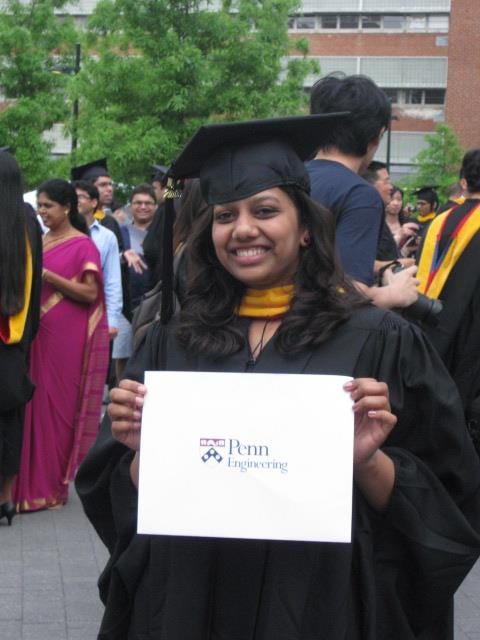Kavita Kamesh: Voices of Penn Engineering Master’s Alumni
This is a part of our series of articles, written by Penn Engineering alums about their experiences at Penn and how it shaped their lives. Our next article is written by Kavita Kamesh, who graduated with a master’s in Embedded Systems (EMBS) in 2013. She is currently working as a protocol stack developer at Intel Mobile Communications based in San Diego. Kavita is also an active YouTuber and singer, performing regularly at events and publishing her songs on YouTube and Facebook.

“An investment in knowledge always pays the best returns.” This philosophy was instilled in me since my childhood, as I grew up seeing my parents working towards their doctorates at the Indian Institute of Science in Bangalore. No words can describe the motivation and the environment they provided for my academic growth.
Growing up in Bangalore, which is also known as the Silicon Valley of India, exposed me to technology at an early age. My schooling at Kendriya Vidyalaya, which was established by two of the premier scientific institutions of India, the National Aerospace Laboratories and the Indian Space Research Organization (ISRO), provided me an opportunity to bond with great scientists and visionaries. Apart from academics, I also trained in Indian classical music, which still helps me to be more productive by being more relaxed.
The four years of my bachelor’s degree in Engineering in Telecommunication at R.V College of Engineering, Bangalore, were a great learning experience that exposed me to a wide range of subjects, such as electronic devices and circuits, control systems and embedded systems. My final-year project, which was done in conjunction with a testing facility at ISRO, required the development of on-chip embedded software. The objective was to develop an automated system to continuously monitor thousands of telemetry parameters in real-time and flash critical data that the Spacecraft Integration team needed to take action on.
My interest and success in embedded systems gave me an opportunity to start my professional career at Robert Bosch, India — an automotive firm — as a software engineer. I was involved in challenging embedded systems projects, such as the development of a system that reduces fuel consumption and emissions by automatically shutting down and restarting the internal combustion engine to reduce the amount of time the engine spends idling.
On one hand, learning new things and meeting these challenges in a work environment was very satisfying. On the other, it increased my desire to learn more about embedded systems and further sharpen my skills. So, after three years of working at Bosch, I decided to pursue a master’s degree in embedded systems. Penn was one of the very few universities in the U.S. offering a specialized degree in this field, and I was overjoyed when I received my selection letter.
Leaving home and moving to a foreign country was not easy. There were many challenges for an international student, however, the Indian Student Association at Penn really made me feel at home and helped me settle in very quickly. Even before I arrived, they answered many of my questions through the Facebook group created to help out incoming students. They even came to pick up the new students at the Philadelphia airport.
The classes that I enjoyed most at Penn were Real-Time Embedded Systems (RTES), taught by Rahul Mangharam, and the course on Embedded Systems /Android Programming taught by Miroslav Pajic, who was then a postdoctoral researcher in the PRECISE Center. Both were project-based courses and we got real hands-on experience with embedded programming. We used to work on the projects and assignments for hours together in the lab and there were many all-nighters, which were both challenging and fun.
In the RTES course, my group built an adaptive cruise control system, which enables you to adjust your vehicle’s speed based on information from on-board sensors and thus maintain a safe distance from the vehicle ahead. We also developed a dashboard that allowed us to dynamically adjust car speeds, lane changes, the safe distance between two cars and the angle of the radar sensor. This project gave us a complete understanding of how a real-time embedded system works end-to-end.
Another memorable experience for me at Penn was being a lead vocalist in Penn Sargam, an Indian fusion band. I was lucky to be a part of such a talented group of musicians. We used to jam every weekend and perform in shows, on and off campus. The music really helped me cope with hectic and stressful study schedules. On the days I had rehearsals, I used to feel doubly pumped to finish my studies or assignments, both before and after our jam sessions. Also, the Indian Student Association at Penn organized a number of events and festival celebrations which helped us stay connected to our roots and also network and make new friends with other students on campus.

In the final semester, Liz Wai-Ping Ng, the Associate Director of the Embedded Systems Graduate Program, was very helpful with the placement process. She guided us all along — writing our resumes, preparing for interviews, applying to embedded systems companies off campus and drafting counter offers for employers. Graduating from an Ivy League school was the proudest moment for me and my family.
I am currently working in the Intel Mobile division as a Modem Software Developer in San Diego, one of the best cities in the U.S., blessed with lots of sunshine and beautiful beaches. One of the things I learned in my Penn days was the importance of having outside interests, so I still pursue my passion for music alongside my work. I perform in a number of shows and events. I am also an active YouTuber and publish my songs regularly on YouTube and Facebook.
All in all, my Penn journey played a very significant role in steering my career path and gave me some very sweet and beautiful memories which I’ll cherish all my life.
